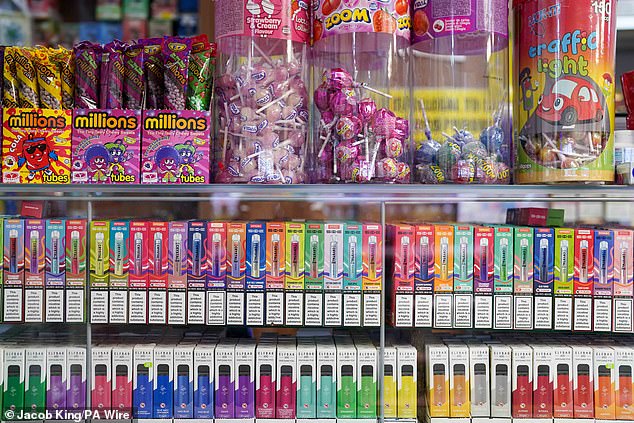Revealed: TikTok merchants illegally sell vapes disguised as lip gloss and candy to young children and use secret code words to trick parents
Vaping products disguised as colorful lip gloss and candy are being openly sold to children on TikTok with secret codes designed to trick parents, an investigation has found.
Researchers analyzed hundreds of posts on the Chinese video-sharing app to identify hashtags that indicate addictive and potentially dangerous e-cigarettes are being sold.
While it may appear as if a clip is advertising innocuous items suitable for young children, the on-screen text tells youngsters in the know that vapes will be hidden in any pack they order.
The study, published in the journal Nicotine and Tobacco Research, identified popular hashtags including #puffbars, #geekbar and #elfbar – all brands of disposable e-cigarettes.
Code words indicating that sellers are offering hidden vapes with featured products include #puffbundles, #discreetshipping, and #hiddennic.
One of the messages identified by the researchers appears to sell candy and lip gloss, but the words “elf bundle” tell young people that a vaping product will be included in the package

Colorful disposable vapes can currently be sold in candy stores and other locations that appeal to children
The words “ALL FAKE” are used in the captions to circumvent TikTok’s algorithms for detecting illegal activity, the researchers said, while #noID indicates that the seller does not need identification for the sale.
Nearly one in five of the vape sales accounts surveyed advertised themselves as a “small business.”
Vaping products were found hidden among innocuous objects in sealed bags or hidden in hair scrunchies.
Professor Page Dobbs from the University of Arkansas said: ‘Parents should be aware that children may receive e-cigarette products through the post.
“These self-identified small businesses target young people by advertising without checking identification.
‘If your child receives a bundle of candy or beauty products in the mail, check the inside of the package or the inside of the scrunchie with a zipper.
“Policymakers and enforcement agencies should also be aware that these products are shipped internationally, which means people are circumventing tobacco laws in multiple countries.”
Overall, the researchers found that 50.4 percent of videos studied promoted popular vaping brands, and 45 percent featured cannabis products.
Videos sent customers to other social media platforms – usually Instagram – which led them to use anonymous messaging apps, including Telegram, to actually purchase the nicotine products.
Nearly half (45.2 percent) of posts said no age verification was required. No video indicated that customers needed to identify themselves before purchasing.
Although the legal age for vaping is 18, the number of children using vaping has tripled in the past three years, according to the Ministry of Health. As many as 1 in 5 children have tried vaping.
The long-term effects of vaping are unknown, although they have been linked to lung scarring, organ failure and asthma.
They are also highly addictive and the cheaply made, battery-operated devices have been known to explode in the user’s hands.
Disposable vapes are mainly linked to their increasing popularity among children. They are cheap and easy to use; 69 percent of vapers between the ages of 11 and 17 use them.
Meanwhile, 63 percent of children between the ages of 13 and 17 use TikTok, where users can post short video clips from unverified and anonymous accounts.
